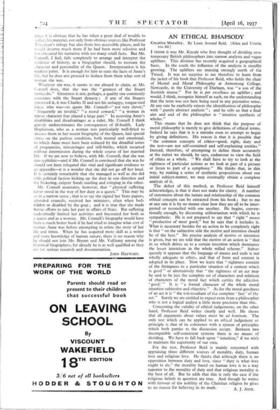AN ETHICAL RHAPSODY
I THINK it was Mr. Kneale who first thought of dividing con- temporary British philosophers into narrow analysts and vague
uplifters. This division has recently acquired a geographical basis. In the south, the influence of the analysts is steadily growing. The uplifters are massing strongly north of the Tweed. It was no surprise to me therefore to learn from the jacket of his book that Professor Reid, who holds the chair of Mental and Moral Philosophy at Armstrong College, Newcastle, in the University of Durham, was " a son of the
Scottish manse." For he is par excellence an uplifter ; and would, I think, recognise himself as such, on the understanding
that the term was not here being used in any pejorative sense. At any rate he explicitly rejects the identification of philosophy with "purely abstract analysis " ; and he tells us that a final aim and end of the philosopher is " intuitive synthesis of wholes."
This means that he does not think that the purpose of moral philosophy is merely to give definitions of ethical terms.
Indeed he says that it is a mistake even to attempt to begin by giving definitions. His reason is that it is possible that " the common concepts of ethics—good, right, duty and the rest—are not self-contained and self-explaining entities."
Instead, therefore, of attempting to ,define them accurately at the outset we should, he says, endeavour to view the field of ethics as a whole. " We shall hive to try to look at the rightness of particular actions as we look at part of a picture or listen to part of a symphony." He thinks that, in this way, by making a series of synthetic .propositions about our initial subject-matter, we may eventually obtain a complete analysis of it.
The defect of this method, as Professor Reid himself acknowledges, is that it does not make for clarity. A number of statements about the nature and relationship of the common ethical concepts can be extracted from his book ; but to me at any rate it is by no means clear how they are all to be inter- preted or reconciled with one another. He begins, conven- tionally enough, by discussing utilitarianism with which he is sympathetic. He is not prepared to say that " right " means " productive of most good," but he says that it includes it. What is necessary besides for an action to be completely right is that " on the subjective side the motive and intention should be of the best." No precise analysis of motive or intention is given, but we are told that the motive of an action is " that in us which drives us to a certain intention which dominates the lesser intentions in the whole willed scheme." Subse- quently it appears that the language of means and ends is not wholly adequate to ethics, and that of form and content is adopted in its place. Now we learn that " rightness consists of the fittingness to a particular situation of a content which is good " or alternatively that " the rightness of an act may be said to be just the complete set of characters and relations of characters of the moral fact which carries the adjective ' good.' " It is " a formal character. of the whole moral situation subjective and objective." As for the moral goodness of an act it is " the toti-resultant of the complete ' fact ' of the act." Surely we are entitled to expect even from a philosopher who is not a logical analyst a little more precision than this. Concerning the validity of ethical judgements, on the other hand, Professor Reid writes clearly and well. He shows that all arguments about values must be ad hominem. The only test which can be applied to an ethical judgement or principle is that of its coherence with a system of principles which both parties to the discussion accept. Between two incompatible self-consistent systems there is no means of deciding. We have to fall back upon " intuition," if we wish to maintain the superiority of our own.
For the rest, Professor Reid is mainly concerned with appraising three different sources of morality, duty, human love and religious love. He thinks that although there is no opposition between duty and love, since " duty is what•love ought to do," the morality based on human love is in a way superior to the morality of duty and that religious morality is the best of all. But he adds that this is only the case if the religious beliefs in question are true. And though he writes with fervour of the nobility of the Christian religion he given
us no reason -rot believing, in its truth. - - A. j. A.






















































 Previous page
Previous page